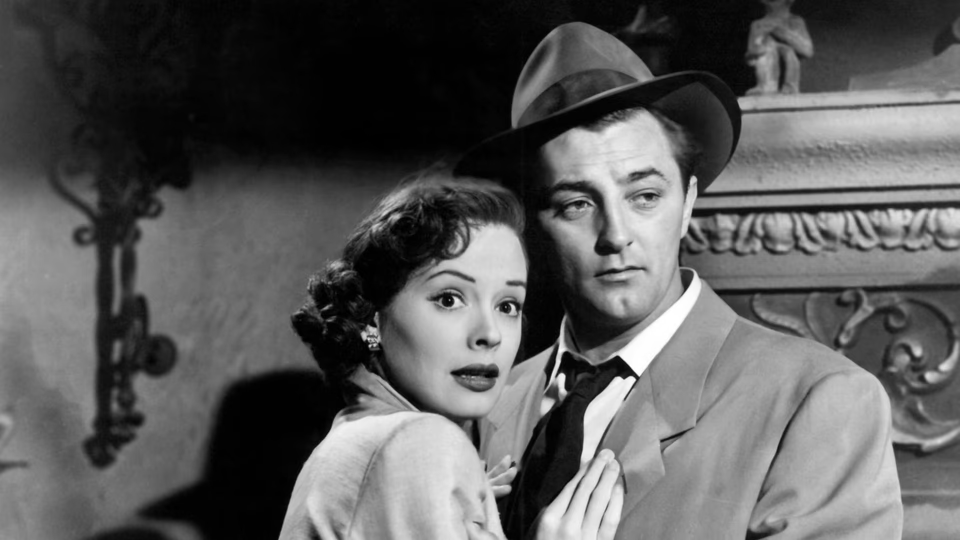The Big Steal

Aboard an ocean liner just docked in Veracruz, Mexico, William Bendix bursts into Robert Mitchum’s cabin pointing a gun. Bendix wants something he believes Mitchum stole. “You’ve got the wrong man,” Mitchum says.
Bendix isn’t buying it. He moves to arrest Mitchum, but Mitchum overpowers him and knocks him out. Mitchum takes Bendix’s gun and identification. The identification reads: Captain Vincent Blake of the US Army.
After debarking, Mitchum crosses paths with Jane Greer. It’s a short meeting, as Mitchum has to duck out of sight when Bendix emerges from the ship. Once the coast is clear, Mitchum tries catching a cab, but finds Greer has gotten the last one.
Cut to a room inside the Hotel Mexico. Patric Knowles is packing in a hurry. His eyes dart around the room. There’s a knock at the door. Knowles pulls a gun and moves to answer. Then we hear Greer’s voice, telling him to open up. We learn Knowles is Greer’s fiancée. But she’s not there to marry him. She’s there because Knowles ran off with her savings. Two thousand dollars. She wants it back.
Knowles tries to sweet talk her, but Greer cuts him off saying, “The last time you did that, it cost me my bank account.”
Knowles tries chiding her. “There’s that dollar sign again,” he says.
“Where? I don’t see it. Come on, hand it over,” Greer says. Then, dripping with sarcasm, adds, “I was saving that money for my trousseau.”
Knowles gives Greer the slip, and a few beats later we learn Mitchum is after Knowles, too.
Thus, the film becomes one big chase. Bendix chases Mitchum who, along with Greer, chases Knowles. Mitchum and Greer form an uneasy partnership as they travel across the Mexican countryside from Veracruz to Tehuacán. The Mexican locales belie the film’s modest budget.
As the story unfolds, we learn who stole what from whom. Mitchum and Greer warm to each other. Everything culminates in a surprising but satisfying finale.
On paper, it’s another forgettable lower-budget entry from RKO, the once premier studio fallen to disarray under Howard Hughes. But thanks to a crackerjack script, The Big Steal shines.
Like the best scripts, it starts as late into the story as possible. Rather than open with a flashback or exposition, we’re thrown right into one unnamed man confronting another. Great storytelling, but it’s Greer’s character who sparkles.
It’s refreshing to see such an independent female character. She’s self-assured but not arrogant. Insistent but not whiny. The script may leave the fisticuffs to the men, but Greer’s character holds her own in the numerous bouts of verbal sparring, sporting a half-smirk that outshines everyone on screen.
For example, early in the chase, Greer is driving with Mitchum in the passenger seat. Greer realizes Mitchum’s fighting the rap for something Knowles did and says as much. Mitchum, astonished, asks if he can fill in some details. “As long as it isn’t too sad,” Greer says, with her half-smirk. “You see when I hear sad stories I cry, and when I cry I can’t drive.”
Marlowe couldn’t have said it better.
The script also subverts our expectations. From the anything-but-inept Mexican police inspector, to Greer—not Mitchum—being the one to get them out of various jams, the script defies the genre’s conventions.
And topping it all off, director Don Siegel has Mitchum wear the results of his tussles. From a bloody nose to a beaten face, the film’s fights have visible consequences. Something all too rare in Hollywood.
Granted, it’s not a perfect film. The extended—and sometimes over-cranked—car chase feels drawn out. And Knowles and Bendix don’t hold their own against Mitchum and Greer in terms of star wattage. But these prove minor quibbles. The Big Steal’s script along with Mitchum and Greer’s execution elevates a B-Movie to near greatness.